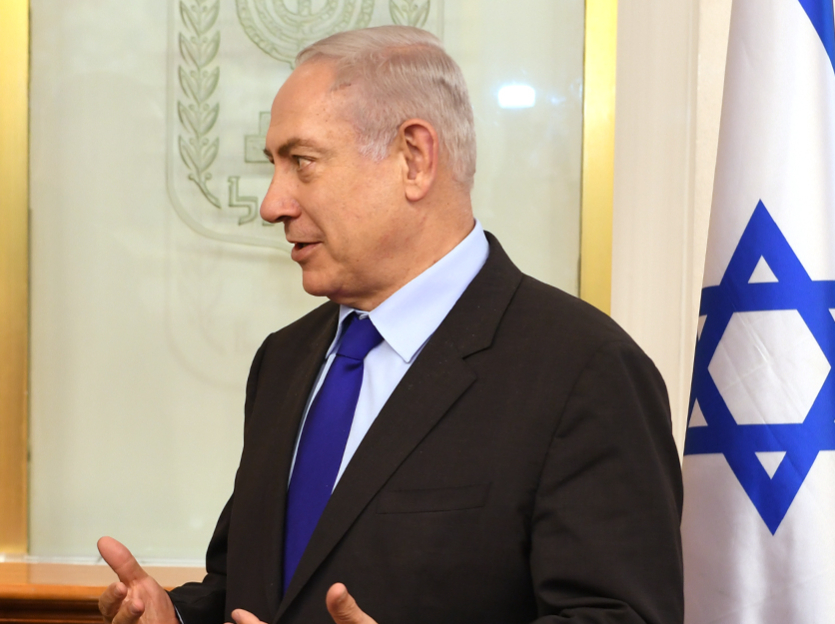Civilization
Netanyahu’s “Saudi Bind” Muddles Planning for “The Day After”
Benjamin Netanyahu needs to deal with his “Saudi bind” before he can plan effectively for the day after HAMAS in Gaza.

TEL AVIV — “Hamas must be destroyed, Gaza must be demilitarized, and Palestinian society must be deradicalized,” maintained Israel Prime Minister Benjamin Netanyahu last week in a Wall Street Journal op-ed. “These are the three prerequisites for peace between Israel and its Palestinian neighbors in Gaza.”
After Israel destroys Hamas, Netanyahu made clear, the Palestinian Authority – which is led by 88-year-old President Mahmoud Abbas and governs Palestinians living in Judea and Samaria – would have no role in demilitarizing Gaza or in removing the teaching of hatred and the preaching of terror from its schools. Furthermore, Netanyahu emphasized, “For the foreseeable future Israel will have to retain overriding security responsibility over Gaza.”
Netanyahu left unclear, however, the PA’s role, if any – or that of affiliated individuals – in administering and rebuilding Gaza the day after Israel concludes major military operations against Hamas. He also omitted mention of the PA’s place, if any, in governing the tiny, war-torn stretch of land, home to some 2.2 million Palestinians, the day after “Hamas is destroyed, Gaza is demilitarized and Palestinian society begins a deradicalization process.”
One reason for his ambiguity on the distribution of responsibility in rebuilding and governing Gaza is Netanyahu’s Saudi bind. Keen to reach a formal agreement with Riyadh on normalizing relations, Netanyahu nevertheless assembled a coalition after his narrow victory in the November 2022 elections, some of whose extreme members would rather bring down the government than support measures promoting Palestinian self-government necessary to seal a Saudi deal. Because of U.S. interest in a stable Middle East, Netanyahu’s Saudi bind is also America’s Saudi bind.
The prime minister’s Saudi bind came into focus early last year not long after his governing coalition took office in late December 2022. Two hardline religious nationalists essential to preserving Netanyahu’s coalition – Treasury Minister and Minister in the Defense Ministry Bezalel Smotrich and National Security Minister Itamar Ben-Gvir – could be counted on to reject steps toward greater Palestinian prosperity and self-rule that Saudi Arabia had publicly indicated were a precondition for establishing official diplomatic relations with Israel.
Furthermore, the ill-conceived judicial overhaul that Justice Minister Yariv Levin announced one week after Netanyahu’s government was sworn in weakened the prime minister’s already weak prospects for a breakthrough with Riyadh. Controversy over the government’s sweeping reform package – characterized by an impassioned opposition as “regime change” – plunged Israel into a political crisis that consumed the nation until approximately 6:30 a.m. on Oct. 7, when Hamas jihadists launched their inhuman rampage through Israel’s Gaza-border communities.
Netanyahu’s Saudi bind reemerged in September in advance of the Oct. 7 massacre, which Iran-backed Hamas probably timed to undermine even the remote possibility that Israel and Saudi Arabia might overcome their differences. Saudi Arabia Crown Prince and Prime Minister Mohammed bin Salman had let it be known that in pursuit of an agreement with the United States to improve security cooperation between the two nations – the principal threat coming from the Islamic Republic of Iran, the chief sponsor of Hezbollah as well as Hamas – the kingdom also sought a normalization accord with Israel. To move forward, MBS stipulated, Israel would need to take tangible steps to show its commitment to the establishment of a Palestinian state. Ministers Smotrich and Ben-Gvir, however, remained both daunting obstacles to compromise and essential components of Netanyahu’s coalition.
The Israel-Hamas war has produced a third iteration of Netanyahu’s Saudi bind. Instead of poisoning Israel’s relations with the Muslim world as the jihadists hoped, Hamas’ savage attack persuaded Saudi Arabia along with the United Arab Emirates, Egypt, and others – though they won’t say this out loud – that Israel must destroy Hamas as a fighting force and governing organization.
At the same time, according to several Israelis familiar with Riyadh’s thinking, Saudi Arabia is prepared to provide substantial financial assistance to reconstruct Gaza. The Saudis, however, have attached two conditions. First, Israel must demonstrate its willingness to advance the establishment of a Palestinian state. Second, Israel must accept the Palestinian Authority as the ruling power in Gaza. So stated, it is harder to imagine Smotrich and Ben-Gvir acquiescing to these terms than the ones the Saudis set for normalization.
The Biden administration – which, to its great credit, has ensured that Israel receives the munitions necessary to wage war against Hamas and defended Israel against denunciation in the United Nations – has doubled down on its support for a Palestinian state encompassing West Bank Palestinians as well as those in Gaza. In early November, at the G7 Foreign Ministers meeting in Tokyo, Secretary of State Antony Blinken stressed that “sustained peace between Israel and the Palestinians must include the Palestinian people’s voices and aspirations at the center of post-crisis governance in Gaza” as well as “Palestinian-led governance and Gaza unified with the West Bank under the Palestinian Authority.” Less than two weeks later in a Washington Post op-ed, President Biden stated that “We stand firmly with the Israeli people as they defend themselves against the murderous nihilism of Hamas” while insisting that “The Palestinian people deserve a state of their own and a future free from Hamas.”
During his mid-December visit to Israel, National Security Adviser Jake Sullivan introduced a crucial qualification to the administration’s backing of the PA and a Palestinian state. “Ultimately, governance of the West Bank and Gaza needs to be connected,” Sullivan asserted. “And it needs to be connected under a revamped and revitalized Palestinian Authority.”
Sullivan’s refinement of the Biden administration position – the PA that “ultimately” governs Palestinians in Judea and Samaria and which will return to Gaza must be “revamped and revitalized” – is crucial because the Palestinian Authority that exists today is weak and corrupt. It also lacks legitimacy: If the PA had deigned to hold an election for president since Abbas’ term expired in 2009, Hamas probably would have won. Consequently, the PA maintains power in the West Bank thanks to substantial security assistance from the Israel Defense Forces and the Israeli Security Agency (Shabak).
The best that might be said about the PA’s playing a key role in the reconstruction and governing of Gaza – and it is decisive – is that the alternatives are worse. An international coalition is bound to be unmotivated, incompetent, and toothless. Israeli rule would place the Jewish state back where it was in 2005 before it evacuated Gaza – governing a people who bitterly resent it, only this time the population has almost doubled and many among them will be keen to exact revenge for the devastation wrought by the current war. New York Times columnist Thomas Friedman’s frivolous suggestion that Israel should simply exit Gaza and let Hamas leader Yahya Sinwar pay the price of taking responsibility for picking up the pieces is a recipe for bloody chaos on Israel’s border.
While Netanyahu has not presented the public a plan for the day after, other than a commitment to demilitarization and deradicalization, a widespread consensus prevails within the Israeli security establishment and among the citizenry that Israel must retain overall security control of Gaza for the indefinite future. While the security establishment also generally believes that Palestinians connected in one way or the other to the PA must take part in reconstructing and governing Gaza, the public appears to be less persuaded. The political leadership has done little to persuade them.
As Shmuel Rosner argued in his weekend column in the Hebrew language daily Maariv, a version of which was translated in the Jewish Journal, neither Netanyahu nor other high officials have told a traumatized public the hard truth: “Israel has no convincing alternative to the Palestinian Authority.” The best available plan resembles, maintains Rosner, “what has been going on for many years, with varying degrees of success, in Judea and Samaria. In other words: control by the PA, and freedom of action for the IDF.” This is not “a perfect solution,” Rosner recognizes, but it is “a realistic, tolerable one.”
This highly imperfect option – whose principal merit is that it is less flawed than the others – can be reconciled “ultimately” with U.S. National Security Adviser Sullivan’s call for a “revamped and revitalized” PA. Such a reconciliation might also enable Netanyahu to extricate himself – and the United States – from his Saudi bind by meeting Riyadh’s demands without provoking Smotrich and Ben-Gvir to topple the government. Netanyahu need only employ his vaunted rhetorical skills to define a revamped and revitalized PA as one that ultimately meets the conditions that he specified in his 2009 Bar Ilan speech for establishing a Palestinian state: The PA must recognize Israel as the nation-state of the Jewish people and accept demilitarization of its own state-to-be.
By reaffirming his own baseline for establishing a Palestinian state, Netanyahu would enable Israel to take advantage of Saudi financial support and American diplomatic support. He would also act on a principle that guides the best security thinking in the Jewish state: Israel should provide for the maximum Palestinian self-rule consistent with the fundamental requirements of Israeli national security.
This article was originally published by RealClearPolitics and made available via RealClearWire.
Peter Berkowitz is the Tad and Dianne Taube senior fellow at the Hoover Institution, Stanford University. From 2019 to 2021, he served as director of the Policy Planning Staff at the U.S. State Department.
-

 Civilization2 days ago
Civilization2 days agoWhy Europe Shouldn’t Be Upset at Trump’s Venezuelan Actions
-

 Accountability4 days ago
Accountability4 days agoWaste of the Day: Principal Bought Lobster with School Funds
-

 Executive3 days ago
Executive3 days agoHow Relaxed COVID-Era Rules Fueled Minnesota’s Biggest Scam
-

 Constitution4 days ago
Constitution4 days agoTrump, Canada, and the Constitutional Problem Beneath the Bridge
-

 Christianity Today2 days ago
Christianity Today2 days agoSurprising Revival: Gen Z Men & Highly Educated Lead Return to Religion
-

 Civilization3 days ago
Civilization3 days agoThe End of Purple States and Competitive Districts
-

 Executive2 days ago
Executive2 days agoWaste of the Day: Can You Hear Me Now?
-

 Executive3 days ago
Executive3 days agoWaste of the Day: States Spent Welfare in “Crazy Ways”













Until the Islam theocracy is destroyed no one in the world is safe -even the people who want to worship Hubal, who is the god of Islam. People need to read the Qur’an and learn what Islam instructs its citizens to do. Islam is rooted in depravity, violence, lies, and immorality. Learn its history.